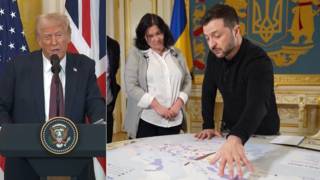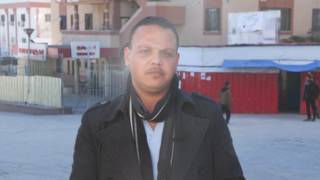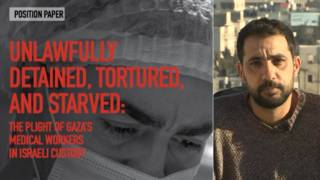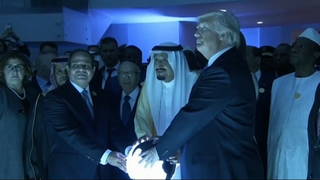
Guests
- Anna Therese Dayindependent journalist who has lived and reported in the Middle East for five years, focusing on how U.S. foreign policy affects young people in the region.
We continue our exclusive interview with one of four U.S. journalists who were detained in the Gulf state of Bahrain and released Sunday after an international outcry. Anna Therese Day and her camera crew were in Bahrain during protests marking the anniversary of the kingdom’s February 2011 uprising. She describes their interrogation and the ongoing crackdown on journalists and human rights advocates in Bahrain.
Transcript
AMY GOODMAN: This is Democracy Now!, democracynow.org, The War and Peace Report. I’m Amy Goodman, with Nermeen Shaikh.
NERMEEN SHAIKH: We continue today with Part 2 of our exclusive interview with one of four U.S. journalists who were detained in the Gulf state of Bahrain and released Sunday after an international outcry. Anna Therese Day and her camera crew were in Bahrain during protests marking the anniversary of the kingdom’s February 2011 uprising. Bahraini authorities accused the group of falsely representing themselves as tourists, and claimed one of them participated in an attack on the police. They were taken into custody and charged with illegal assembly with the intent to commit a crime. During their interrogation, they were initially denied an attorney and prevented from speaking with family members.
AMY GOODMAN: Human Rights First said the arrest of the journalists is part of a continuing crackdown on dissent in Bahrain. This comes as Human Rights First renews its call for the release of Bahraini opposition leader Ibrahim Sharif, who was sentenced to a year in jail just this past Wednesday for a 2015 speech in which he called for change. The Bahraini government has fought to suppress opposition protesters and journalists since the 2011 uprising, that was crushed by martial law and U.S.-backed forces from Saudi Arabia entering Bahrain. Bahrain is a close ally of the U.S. It’s home to the U.S. Navy’s Fifth Fleet, which is responsible for all naval forces in the Gulf.
We continue our conversation with Anna Therese Day, one of the journalists just released from detention in Bahrain.
So, if you can say to us what happened to you when—after your soundman was taken, how you and your other colleagues, your camera crew, was taken, and then what happened to you in detention? What did the Bahraini authorities want to know?
ANNA THERESE DAY: After we were able to leave the neighborhood, which involved, you know, going through a field, climbing a fence, to even get out of these neighborhoods, we were on the highway at about 10 minutes from the neighborhood, and we were stopped at a checkpoint. We realize now that they knew exactly who they were looking for, because all of these young activists had been tweeting our photos. So, we were detained at a police station, held for 48 hours. We were moved around. I had two instances of mistreatment. The men were—the rest of our team were deprived food, water, medicine, and were prevented from calling our embassy, lawyers and family. Again—
AMY GOODMAN: It was you and how many others?
ANNA THERESE DAY: Three others, three of my team
AMY GOODMAN: Including the soundman?
ANNA THERESE DAY: Yes.
AMY GOODMAN: Mm-hmm, and were you kept together?
ANNA THERESE DAY: No, we were isolated so that we would—so they could interrogate us. They were hoping we would, you know, turn on each other.
AMY GOODMAN: Were there—were you the only woman?
ANNA THERESE DAY: Yes, and I was isolated. I was treated differently than the men were. And I think that was because I was the producer on the shoot and I had the names of our Bahraini contacts. And that was something we were very cooperative with the Bahraini police when we were first arrested. We were very forthcoming about being journalists and understanding that, professionally, we do know that we needed to enter on tourist visas—or journalist visas. We made that decision because we wanted to do a very important story, that we still believe in. But we were cooperative.
The tone of the entire interrogation switched gears at about 2:00 a.m. when they started asking us about our sources. They wanted us to reveal their names, identities. Of course, we would never do that, as journalists. But more importantly, in a country like Bahrain, when—where children are being arrested and detained and disappeared, of course we would have never revealed who we were working with inside these neighborhoods.
NERMEEN SHAIKH: Well, Bahrain and the U.S. are very close allies. Could you talk about how the opposition in Bahrain views the U.S.?
ANNA THERESE DAY: What’s so interesting about the Fifth Fleet is, you know, they have about between 5,000 and 15,000 American forces on and off—on and off the island. So there’s a huge American presence. And what I found most interesting in talking to the opposition is that even young activists understood that—they felt the State Department is on their side and the Pentagon is against them. They felt that the State Department has done a lot to document human rights abuses, has done a lot to prevent or delay arms sales to repressive Bahraini authorities. But they feel that because of the Pentagon relationship and the Fifth Fleet, their rights are being compromised.
One other thing that I would note is the opposition is actually incredibly moderate. Their demands are for reform, not even revolution. So they’re asking for the right to—right to vote, the end of discriminatory laws based on their ethnicities. So these are very moderate demands, and it’s, in fact, the government that is quite radical in their crackdown. So, that’s what I find most interesting, and that many of the opposition were incredibly disappointed with the United States, without being angry. They felt a lot of pride in having the Fifth Fleet there, and they didn’t want necessarily to leave. They simply wanted the U.S. to use its influence for reform.
AMY GOODMAN: So, back to this interrogation. You said the tone changed when you said you’re not revealing sources. So what happened then?
ANNA THERESE DAY: I was isolated further from the men, and I was taken to a different police station—in fact, the police station where the protests had been clashing earlier in the day. At that point, again, I had been prevented from talking to the embassy, so no one knew where I was. And I know—knew no one knew where I was. And again, I was taken to a place that would be most frustrated by covering the protests. From there, I was interrogated. We’re filing a complaint about the way I was interrogated. And then we were taken to a sentencing, where the only way I was able to call the embassy was by essentially staging a fit. And we were then sentenced with charges that we didn’t expect. They charged us with participation in unlawful protesting, rioting. The word “terrorism” was thrown around. And that sentence is from 10 days to two years. And, you know, our Bahraini colleagues have life sentences for some of these things.
AMY GOODMAN: In the interrogation, what did they know about you? What information did they have about you?
ANNA THERESE DAY: Right away, they approached me with an op-ed that I wrote in 2012 about Nabeel Rajab, someone that you’ve had on Democracy Now! He’s a human rights defender in Bahrain who was jailed for a tweet. His family continues to live under threat inside Bahrain—there’s a travel ban—when his wife is actually quite sick. So, this is someone who I met in 2011, has faced an enormous amount of oppression. I wrote an op-ed in his defense in 2012. And they immediately brought this up, and they said, “We know you’re a journalist and that you hate the government.”
AMY GOODMAN: Did they have emails of yours?
ANNA THERESE DAY: We actually had emailed, funnily enough, in 2012, after I—after I published that op-ed, they emailed both me and my editor at HuffPo, calling me a liar, direct from the prime minister’s office.
AMY GOODMAN: And they had that there?
ANNA THERESE DAY: Yes. And, well, they were very interested about how that I got in. And we were interested how I got in either, because we expected my name to be on some list because of the previous reporting. So they were very suspicious that we not only got in, but got in with the camera gear that we had.
NERMEEN SHAIKH: Well, in June 2014, we spoke with Nabeel Rajab, head of the Bahrain Center for Human Rights. He joined us after having just been released from serving nearly two years behind bars for his role in pro-democracy protests. We asked him about the role of the U.S. Navy Fifth Fleet in Bahrain and what kind of power the U.S. has in relation to the Bahraini monarchy.
NABEEL RAJAB: The Navy plays a big role, the American Navy, more than the American State Department. And for them, the priority is their presence. Priority is their interests with Bahrain. Priority is the arms sale and all that. So we have been ignored completely by American government and Western power. Very disappointing. And I always say, ignoring the struggle of people and supporting dictators, that push people toward extremism. We’ve been abandoned by the American government. We’ve been ignored completely.
NERMEEN SHAIKH: That was Nabeel Rajab speaking to Democracy Now! in June 2014. So, Anna, could you talk about what’s happening with Nabeel now and how you’ve worked with him in the past?
ANNA THERESE DAY: Nabeel and other human rights defenders in Bahrain were very constructive in working with the government on reforms. But, in fact, in November of 2015, a report came out that showed that the government has only implemented two of the 26 recommendations of this reform. Meanwhile, Nabeel’s colleagues and journalists languish in prisons. Bahrain has one of the highest per capita prison rates in the world. So, their prisons are filled with political prisoners right now whose rights have not been respected, even in terms of the reforms that the government promised.
AMY GOODMAN: And Nabeel Rajab, again, raised in your interrogation.
ANNA THERESE DAY: Yes. He’s a very well-known human rights defender, and he was someone that we had hoped to meet with while in the country. We weren’t able to, because of our deportation. But he’s someone who, you know, really is a tireless advocate. He has a travel ban and needs to leave the country for medical reasons for his wife, and he’s being prevented from doing so.
AMY GOODMAN: What about Abdulhadi Alkhawaja, the whole Alkhawaja family, that has been targeted, the daughters. Abdulhadi Alkhawaja, a human rights activist who served as head of the human rights group before Nabeel Rajab was, but then was arrested and has what? A life sentence?
ANNA THERESE DAY: Yes, the Khawaja family has been under threat, specifically targeted, for years now. I was actually first drawn to one of the stories in Bahrain by one of his daughters, who staged a—she live-streamed a hunger strike. And I bring up the live stream because I think that’s one of the most interesting things about the Bahraini opposition, how savvy they’ve been with social media and targeting the Western world, knowing that many in the United States have never heard of Bahrain, but that it is our government that has the power to really influence theirs.
I met a young man in 2011 who—his cousin had been tortured to death, and the body was released mangled. To have a body released in that condition, they really felt it was sign to the protesters of what they would face in arrest. When I met him, he said that they were—they were targeting Oprah and Rihanna and other celebrities with, you know, trending hashtags, and they were doing that because they saw how Obama ’08’s campaign used social media for social justice. So, again, this is a population that’s very moderate, hyper-educated, simply asking for reform, and really a population that wants to be part of the rest of the world.
AMY GOODMAN: So here you are, a U.S. journalist, with your colleagues. You’re detained. You’re interrogated. You’re held for two days. What role did the U.S. government play? I mean, they support the Bahraini regime. The U.S. Navy Fifth Fleet, as you’ve talked about, is there. What role did they play in what happened to you?
ANNA THERESE DAY: I think there’s always going to be a tension between journalists and the State Department and the Pentagon about these media visas. In an ideal world, of course, we would all get the proper permits to work in these countries. But in countries that have gross repression of freedom of expression, we’re not going to get the press pass and be able to do the stories that we need to tell. So, while the embassy certainly mobilized—the ambassador spoke with my family and spoke with one of the princes of Bahrain. They certainly expedited our release. We were just down in D.C. yesterday. The State Department pulled every lever to get us out swiftly. And so, again, we’re incredibly—
AMY GOODMAN: Well, they certainly have their hands on the levers.
ANNA THERESE DAY: Absolutely. And I think that was what was most frustrating, even being a—
AMY GOODMAN: I mean, this isn’t an enemy government for—
ANNA THERESE DAY: No.
AMY GOODMAN: The U.S. works extremely closely with the Bahraini regime.
ANNA THERESE DAY: Absolutely. And I think that’s one of the most frustrating parts of this story, that we keep on talking in terms of sacrificing human rights for national security, when there are people at the State Department, even inside the Pentagon, who don’t think we need to make that compromise. They actually believe that promotion of our democratic values is a long-term national security strategy. So, to see how—you know, there are great people inside government who, you know, mobilized on our behalf and continue to mobilize for the Bahraini people, but somehow they’re being drowned out by this, you know, maybe antiquated and counterproductive national security strategy.
AMY GOODMAN: And the relationship of another U.S. ally, Saudi Arabia?
ANNA THERESE DAY: Absolutely.
AMY GOODMAN: And the role it plays in maintaining the oppression against the human rights activists?
ANNA THERESE DAY: Yes. A trope that’s used against the opposition inside Bahrain often is that they’re—they’re Iranian-backed. And that’s based on an ethnic interpretation of, again, a popular democrat—movement for democratic reform. But when you talk to opposition, they say—when you ask them about foreign meddling, they always will say, “The only evidence of foreign meddling were Saudi troops that occupied our island.” And that is factually correct and irrefutable.
NERMEEN SHAIKH: Well, I want to turn to a clip of Bahrain’s police chief, Brigadier General Tariq al-Hassan speaking earlier this month.
BRIG. GEN. TARIQ AL-HASSAN: [translated] Unfortunately, the issue of human rights has been misused by some organizations and by some states, and it has been politicized. If it were only about human rights, then they should acknowledge what Bahrain had achieved in this field. This talk of torture in prisons has no evidence today. It’s not reality.
NERMEEN SHAIKH: That’s Bahrain’s police chief. Anna, your response to what he said about the way in which organizations are distorting the issue of human rights?
ANNA THERESE DAY: Currently, there are about 200 children in prison. The police went to a girls’ school, where they—where they took young girls who had been participant in protests, brought them out, asked them to identify their friends, and threatened them with rape. So this is not a country that has followed the reforms that they promised to the opposition movement and that they promised to the international community. So this is—it’s incredibly frustrating to hear them feel comfortable or satisfied with reforms, when so many people are languishing in prison and fear for their lives.
AMY GOODMAN: So what are you planning to do with the footage you got, with what happened to you in Bahrain? You were doing a documentary. What happens now, since you were deported?
ANNA THERESE DAY: Well, we’re delighted that we got the media out. And this is a part of a series—
AMY GOODMAN: How did you get the media out? And what happened? Did they take any of your equipment?
ANNA THERESE DAY: They currently have over $20,000 worth of gear. It was also a virtual reality shoot, so they have really great cameras. We hope that they will cooperate and be professional and get them back to us. We don’t really expect it, though.
AMY GOODMAN: What did they say? Why did they keep it? Why did they steal your equipment?
ANNA THERESE DAY: We were—our case is not closed. And then, we expected it to be closed in three days, because we think it’s pretty straightforward. We can prove we’re journalists, and we can prove we were not participating in protests. But then they moved our gear to a criminal investigative unit, and that could take three months. So we don’t expect to get it back.
AMY GOODMAN: How did you get your footage out?
ANNA THERESE DAY: We put—I put DSDs inside me, and we got it out.
AMY GOODMAN: And so, your plans now?
ANNA THERESE DAY: Well, this is part of a six-part series on how U.S. foreign policy affects young people in the Middle East. We were in Gaza, Egypt and in Bahrain. We think that—we’re going to continue our coverage, and we think Bahrain is one of the most undercovered and important countries in the Middle East in terms of U.S. compromises.
AMY GOODMAN: Well, I want to thank you so much for being with us. Anna Therese Day, independent journalist, lived and reported in the Middle East for five years, focusing on how U.S. foreign policy affects young people in the region. She was just deported from Bahrain with her camera crew. This is Democracy Now! I’m Amy Goodman, with Nermeen Shaikh. Thanks for joining us.











Media Options